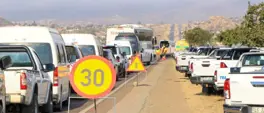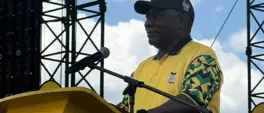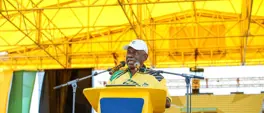Govt officially scraps e-tolls, gantries to come down in April
Paula Luckhoff
28 March 2024 | 19:37The Money Show gets comment from analyst and activist Khaya Sithole.
The decade-long e-tolls saga is finally reaching a conclusion, according to a proclamation published in the Government Gazette on Thursday.
It officially scraps e-toll gantries on Gauteng highways, starting next month.
RELATED: Gauteng must pay for GFIP roads if e-tolls aren't, says Treasury
A communique from the Department of Transport said government would start de-linking e-tolls from their gantries on 11 April 'from 11:59:59'.
"Parties agreed to enter into a Memorandum of Agreement to formalise alternative funding solutions for the GFIP [Gauteng Freeway Improvement Project] debt repayment and deal with the backlog of maintenance and rehabilitation costs."
Department of Transport
Bruce Whitfield gets comment from analyst and activist Khaya Sithole on The Money Show.
JOINT COMMUNIQUE:
— Department of Transport (@Dotransport) March 28, 2024
GOVERNMENT TO DE-LINK ETOLLS FROM THE GANTRIES ON 11 APRIL 2024 pic.twitter.com/vgrCMj2Vvl
Sithole believes the primary mistake made with the user-pay model, aside from a lack of consultation, was the way it was decided to implement the system.
"They implemented it in a way that you and I could find a way to resist..."
Khaya Sithole, Analyst and activist
Sithole compares it to the increase in VAT a few years ago from 14% to 15% which people would not have been happy about.
Because the government implemented it in a way that didn't give citizens the latitude to resist he says, we had to live with it.
The interesting development with the e-toll drama, he says, is that we've moved on from the original question of whether citizens at large should pay for it through the national system, to which the answer was 'no'.
"We've moved on to the secondary question of whether only those that use the roads should pay."
"Now we've ended up with a model that says all the citizens of Gauteng are essentially responsible for this because it has now moved on to the provincial balance sheet."
Khaya Sithole, Analyst and activist
Even that is an incomplete assessment, Sithole says.
He notes that that because only 30% has moved to the provincial balance sheet, the remaining 70% has simply been allocated to the national balance sheet because National Treasury is going to pay for it.
"The citizens of Gauteng are now responsbile not only for their share of the 70%, which is going to be absorbed by the national fiscus at large, but also specifically for the 30% share from the provincial budget."
"The problem is that the provincial budget doesn't have the capacity right now to absorb its share which is around R13 billion AND the maintenance costs."
Khaya Sithole, Analyst and activist
Scroll up to hear the complete conversation
Get the whole picture 💡
Take a look at the topic timeline for all related articles.














